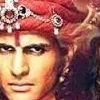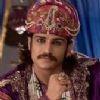Originally posted by: sashashyam
Folks,
Being somewhat handicapped at this point of time by the fear that my displaced neck vertebrae might start acting up again, and paralyse me with shooting pain in the shoulders and arms, I am forced to keep this relatively short, by my standards, that is😉! And also to handle the episodes from 16 to 21 in two posts, each covering a different aspect of the show and the characters.
No pain can lessen the sparkle in your posts even by the tiniest shade...👏 I was reminded of Tennyson's words...
Tho' much is taken, much abides; and tho'
We are not now that strength which in old days
Moved earth and heaven, that which we are, we are;
One equal temper of heroic hearts,
Made weak by time and fate, but strong in will 👏
Coming of Age: It was High Drama (with mandatory caps) all through this segment, as Jalaluddin Mohammed, the erstwhile👏 protege of Bairam Khan and de jure Mughal Emperor, finally came into his own, staring down his Khan Baba in a fierce tussle of wills. It was a watershed on the long road that would lead him, and us, to the Emperor Akbar the Great (a patent verbal redundancy, as Akbar itself means 'the Great'), and it lived up to all our expectations and more.
These episodes portrayed Jalal as closest to Akbar the Great, was layered and had siyaasat at its best with the line between duties and rights meandering into one another and the resultant clash of strong personalities...i very badly needed to watch these episodes to shake off the buddhuram image..
The prelude: The way in which Jalal gets to know about the murder of Raja Takhatmal by Bairam Khan is itself an illustration of how fate plays into the hands of (wo)men, in this instance, Mahaam Anga. She is just thru with warning her blockhead of a son to keep his fingers out of l'affaire Takhatmal, and is looking around for a way to convey the fell news to Jalal without her fingerprints being all over it. And lo and behold, the ideal tool just drops into her lap, like manna from Heaven! Exactly as in the case of the blinding of Zaheer, when the hakim came in at just the right moment. Shaitan surely looks out for his own!
Shaitaan tempts the fallible with all perks and golden opportunities and leads them happily to their own fall. Higher the rise, greater the fall for those who choose to rise holding Shaitaan's hands. MA is the perfect example of disgraced fall.
As Jalal listens to Takhatmal's soldier pouring his heart out, we can practically feel the rage rising in him like molten lava. The narrowed eyes have a manic glare. A hand clenches on the hilt of his sword and almost crushes it.
Sorry! Ididn't note any of that...🤪I was so captivated by the dashing set-wet looks and the absolute royalty radiating from every inch of his persona even without his taj and royal robes, draped in the red shawl...(that was eventually sent to Amer as a gift for munh dikhayi...🤣)
Eventually, he stands up, and we see, with somewhat of a shock, (and I was shaken out my stupor) that his face is smooth and inscrutable. The rage that was consuming him only moments ago has disappeared without a trace, and as he leans back in his seat, the whole body is loose and relaxed. The change in the body language is as startling as it is eloquent. The Shahenshah has made up his mind, and he knows exactly what he has to do and how.
The tectonic clash:The scene that follows could have been scripted by a Renaissance dramatist. Jalal never once raises his voice, but his level tones have a force and a finality to them that none of Bairam Khan's high pitched rants can command.
When Jalal effectively ignores Bairam Khan even when he has marched right up to the Shahenshah, and issues a stream of orders to rehabilitate the Takhatmal family, Bairam Khan seems to lose it totally. The crude putdowns of Jalal, and the self-glorification he indulges in reach their nadir when he derides the Emperor Humayun as totally ineffective.
Which leads to Jalal making it clear to his former mentor, with unprecedented bluntness, when he asserts his rank as the Wazir-e"Aala of the Mughal sultanat, that
(a) Aur hum is sultanat ke Shahenshah hain.
(b) Aapko faisle lene ka haq humne diya tha.. aapko Wazir-e-Aala ka auda humne diya,
(c)Us insaan ki jaan lekar jisne hamare walid ki jaan bachayi thi, aapne gunah-e-azeem kiya hai, and
(c) that while he would never wage war against his Khan Baba, lekin agar baaghi baghawat karega to yeh badshah apni talwar zaroor uthayega....
The final denouement seems scripted to sum up in itself the essence of the scene. As Bairam Khan is storming out of the Diwan-e-Khas, Jalal calls out Baba! Khan stops, hoping against hope for a reprieve, some shred of pride that he could perhaps salvage. There is none.
Instead, Jalal delivers his final warning: Aapne humein har jung se pehle ek taalim di thi, ki jung jaisi bhi ho, jis se bhi ho, humein har hal mein jeetna hai..Aap ki yeh taalim hum kabhi nahin bhoole hain..Aur na hi bhoolenge...
Every word spoken and unspoken in the scene was extremely powerful. Jalal, having made up his mind to exhibit his displeasure at Khan Baba's overriding his orders, that too behind him, is prepared for any eventuality. Had Khan Baba insisted on Takhtmal's execution with Jalal and fought the case with him directly, there might have been a chance. This was no case of petty civil issues where Jalal could let his Baba have his way. And this came just after the Zaheer case and added insult insult to injury which prompted Jalal to turn deaf ears to his Baba's tirades.
The double wave: He then sweeps past Bairam Khan and exits, in effect preempting him. Immediately, all the courtiers stream after the Emperor, forming a double wave that flows past Bairam Khan as he stands, still and isolated, in the centre of the hall. It is as if all his vaunted powers were flowing out of him with that double wave, leaving him a hollow shell bereft of all but life.
What an imagery!👏
It was an extraordinarily effective take, this double wave, a superb blending of the vision of the director and the cinematographer. I have rarely seen a scene ended with such elegiac smoothness, the visuals conveying the essence of the climatic change that had just occurred, and this without a word being spoken. Beautiful.
Beautifully envisaged and created and beautifully described too.👏
When Jalal asks him why he had had Zaheer imprisoned, Bairam Khan launches into a tirade of self-exculpation and self-glorification: Aapki umr jab 14 baras ki thi, tab se yeh faisle hum hi lete aarahe hain..Aapke walid Mohataram ne aapki hifazat ki zimmedari humein di thi..Humare farzand ki tarah paala hai aapko..Hum aisa koyi faisla nahin lenge jo aapke haq mein na ho.. He stoutly denies that he has done anything wrong, even as Jalal looks at him with level, cold, questioning eyes.
Khan Baba's standard mantra parallel to MA's Dhoodh ka karz...😆 The only difference being that while MA reminds her contributions and asserts her rights in the most heart-rending way while BK demands them as though it were his birthright. That is why MA lasted longer than BK. But none could retain their importance as they sought more importance than what was their due. And they lost what they held too. Reminds me of Kannadasan's lines from his famous song 'Varavu ettana'
Nilaimaikku mele ninaippu irundhaal, nimmadhi irukkaadhu
Alavukku mele aasaigal irundhaal ulladhum nilaikkaadhu...😆
Finally, in an extraordinarily arrogant and insulting gesture, Bairam Khan, after asserting: Hum ne wohi kiya jo Wazir-e-sultanat ko karna chahiye.. turns on his heel and strides out, without, as Maham promptly points out to Jalal, having taken the Shahenshah's permission to retire, or even offered a salutation before he left.She drives the point home with a silken comment, like a hot knife going thru butter. Agar wo aapko dil se Shahenshah maante, to aisa kabhi nahin karte...
Trust this lady to create divides. She is matchless in the art of mind-poisoning. 😈
Jalal looks brooding and uncertain, but surely Maham's arrow has gone home. 😈
The Takhatmal affair: If I was to pick the second best scene of these 6 days, it would not be the hamaam one over which so many young ladies here were surely in ecstasies (at the risk of being pelted with rotten tomatoes, I would say that Rajat needs to work out more in the gym and try for at least 4 pack abs, if not 6 or 8. Right now, when exposed, front or back, he looks like a very handsome, khaate peete ghar ka ladka!😉 ).
Anjali has answered this most appropriately...🤣
By the end of the week, this power play had ended: Bairam Khan had destroyed himself thru sheer stupidity and overweening conceit. And the fact that Takhatmal managed to take his revenge on BairamKhan from beyond the grave is exquisite irony.
👏 and Zaheer too. Unjust Cruelty to Zaheer was BK's first fall in Jalal's eyes. All his prior unjust acts were probably against those whom Jalal did not know and thought that probably his Baba was right. But in Zaheer's case he knew all angles and there was his guilt too that he was responsible for Zaheer's fate. Most of the tyrants face their fall due to those they repressed.
Jungi riyaaz aur siyaasat: I have rarely seen a scene as dramatic, indeed startling, as the one where Jalal literally hurtles at us, reaching almost out of the frame as he whirls and turns with bewildering speed, his shamsheer tracing arcs that glitter in the sun. He reminded me of nothing so much as one of the whirling dervishes of Turkey. It was a dazzling display of control, at a speed and with a weapon that were both very dangerous.
Though Jalal dismisses Abdul's wise and well-argued warning that Jalal should be wary of the rebuffed Wazir-e-Aala, he does add in the end: Unhon ne hi humein sikhaya hai ki ek Shahenshah ka farman sabse bada hota hai. Aur us sab mein wo bhi shaamil hain.. Yakeen hai humein ki wo hamare is farman ki izzat zaroor karenge..
Had BK done that he would have risen a hundred times for Jalal. But then, as Dumbledore says, he wouldn't have been Voldemort at all...had BK understood the other person's zehen and respected them, then he wouldn't have been BK at all.
But of course this touching faith of Jalal's is betrayed, and this forces him to finally cross his own personal Rubicon. And in the process he begins to discover himself and what he is capable of. He is now finally set on the path to becoming Akbar.
👏
A friendship beyond compare: On a different note, I loved the endearing note in Jalal's voice as he asks Abdul: Tumhein maut se dar nahin lagta hai na? And Abdul replies in a classic assertion of love and loyalty: Apni maut se to bilkul dar nahin lagta Shahenshah, par aapke saath kuch bura ho, is khyal se dar zaroor lagta hai.
I have said this before, and I will say it again. The CVs committed an act of unbelievable folly when the dropped Abdul, not just the actor, but the character as well, for no rhyme or reason.
😭
That is it for today folks. I left out Jodha completely and she does not fit in here.
No wonder these episodes had a touch of class to them.😉














comment:
p_commentcount